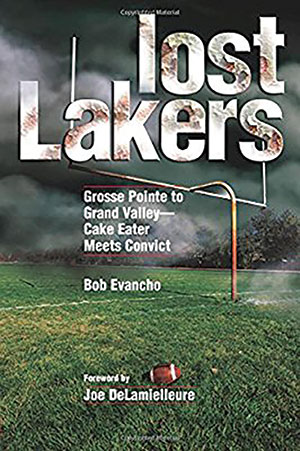
Once upon a time, St. Paul High School in Grosse Pointe Farms had a football team.
You’re thinking, I must mean basketball. The Lakers were state champs twice, state runners-up twice, and Catholic League champs three years in a row.
In football, St. Paul served as Catholic League doormats for most of 16 autumns, between 1954 and 1970, when the team showed up on the losing side 60 times out of a hundred games — and five ties. How did they manage not lose those games?
Bob Evancho was there for three of those seasons, 1967-68-69. He’s written a recently released book about it: “Lost Lakers: Grosse Pointe to Grand Valley – Cake Eater Meets Convict.”
“It’s two books in one,” Evancho told me from his home in Idaho, where he has lived for nearly 40 years. “One part is about growing up in Detroit, and the other about Hook, the ex-con I met at Grand Valley.”
Living near Gaffke Park in St. Clair Shores, where he was reared for the first 14 years of his life, Bob and neighborhood kids played year-round outside from morning till night.
“I loved playing sports. It was the most important thing in my life,” Evancho said. “I liked the competition, the excitement. To this day, I can’t explain it.”
He didn’t think he was a “total klutz,” Evancho wrote in his prologue. “It seemed that wherever I played, whatever the sport, almost everyone else was better than I was.”
Before Evancho arrived at St. Paul, his athletic “lowlights” included being kicked off the Roseville Sacred Heart CYO football team two weeks into the season and failing tryouts to make the football, basketball and baseball teams his freshman year at Sacred Heart High School.
On July 24, 1967 — the day after one of the deadliest race riots in American history erupted on Detroit’s near west side — the Evancho family moved to the Mack and Outer Drive area on the Detroit side of the border with Grosse Pointe Park. That necessitated the transfer to St. Paul.
In the three years it took Evancho to write his book, he contacted dozens and dozens of former teammates, even opposing coaches and players, for their input.
He captures your imagination as he wove what they shared with his own memories to produce a poignant portrait.
You ache along with the players putting up with hard-nosed practices the coaches (a.k.a. drill sergeants) put the kids through. In particular, George Sahadi was a stern taskmaster. In 2000, Evancho visited Sahadi, who was nearing the end of a Hall of Fame 33-year career at Harper Woods Bishop Gallagher.
“Yeah, I was tough on you guys ... But that was a long time ago. And we all learn from our mistakes, don’t we?”
You feel Evancho’s glee when, in a JV game, he blocked a punt and recovered the loose ball in the end zone for a touchdown. Otherwise, he was a rarely used benchwarmer.
You feel the team’s joy when they would win a game. That happened only six times in the three years. No victory was more memorable than on a Sunday night at Jayne Field on Detroit’s northeast side.
The undercurrent of racial tension was still simmering a year later. The St. Paul “cake eaters” — an insult opponents shouted at the supposedly wealthy kids from Grosse Pointe, although Evancho points out a good many of the students came from nearby middle-class suburbs — upset predominantly African-American East Catholic, 7-6. The Lakers’ bus hit the road as quickly as possible in a hail of rocks.
Just three days earlier, Evancho had been downtown with his friends, high-fiving blacks and whites alike, celebrating the Tigers beating the St. Louis Cardinals for the 1968 World Series.
Evancho arrived at Grand Valley State College (also the Lakers) in August 1972 looking forward to playing football in spite a good friend’s advice: “You’re no good. You’ll get hurt.” And that’s exactly what happened. During an intrasquad scrimmage, he suffered severely strained ligaments in his left leg. That was the end of his football career.
That’s where he met an ex-con named Reginald “Hook” Johnson, who became a respected figure on campus and was elected student government vice president.
Nearly 40 years later, Evancho located Hook in the Jackson penitentiary serving a life sentence as an accomplice in the murder of four people during an armed robbery of a jewelry store in River Rouge in 1975.
In 2015, Evancho visited Hook at the Detroit Reentry Center on Ryan Road, where he had been since 2006 — and still is — diagnosed with kidney failure and on dialysis. In their last visit before publication, Hook told Evancho: “This book has given me something to live for.”
Evancho, who will be 64 in May, worked on three daily newspapers and for the Associated Press before joining Boise State University as a writer/editor in the marketing department from 1986 until retirement in 2015. He has won several writing awards.
He married Susan Brick — a 1973 alumna of Bloomfield Hills Marian — in 1977. They have three adult children.
In so many ways, Evancho’s story is mine; maybe yours, too. His quest for stardom is one shared by us mere mortals who admire and applaud the feats of our sports heroes, and say to ourselves: “There, but by the grace of God ...”
Copies of the book may be purchased at bootlegbooksboise.com or on Amazon. The price is $14.95.
Don Horkey may be reached at [email protected].










